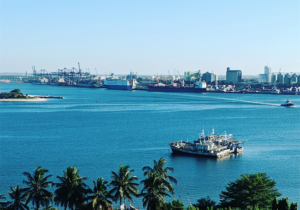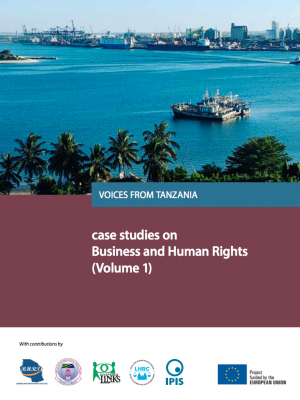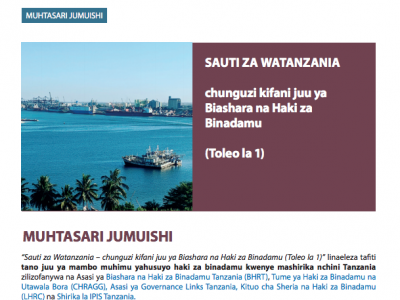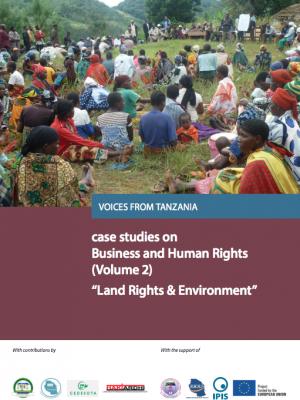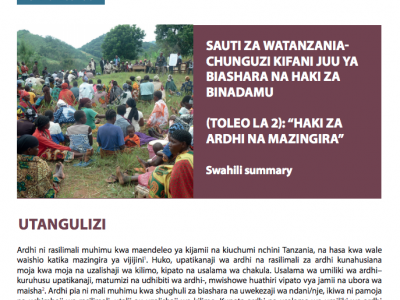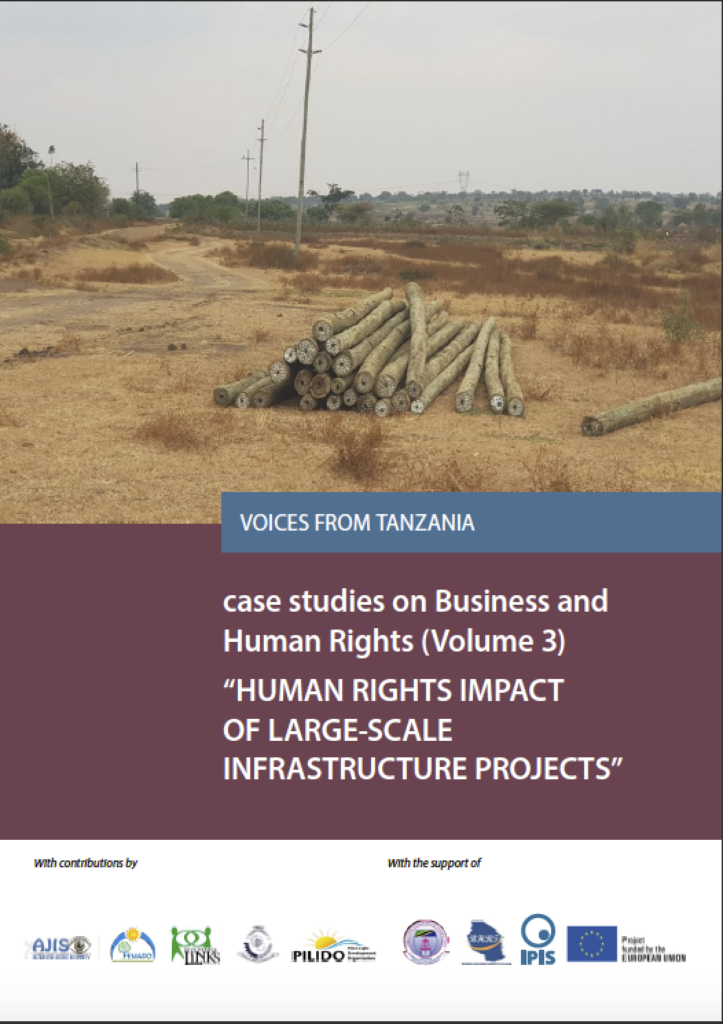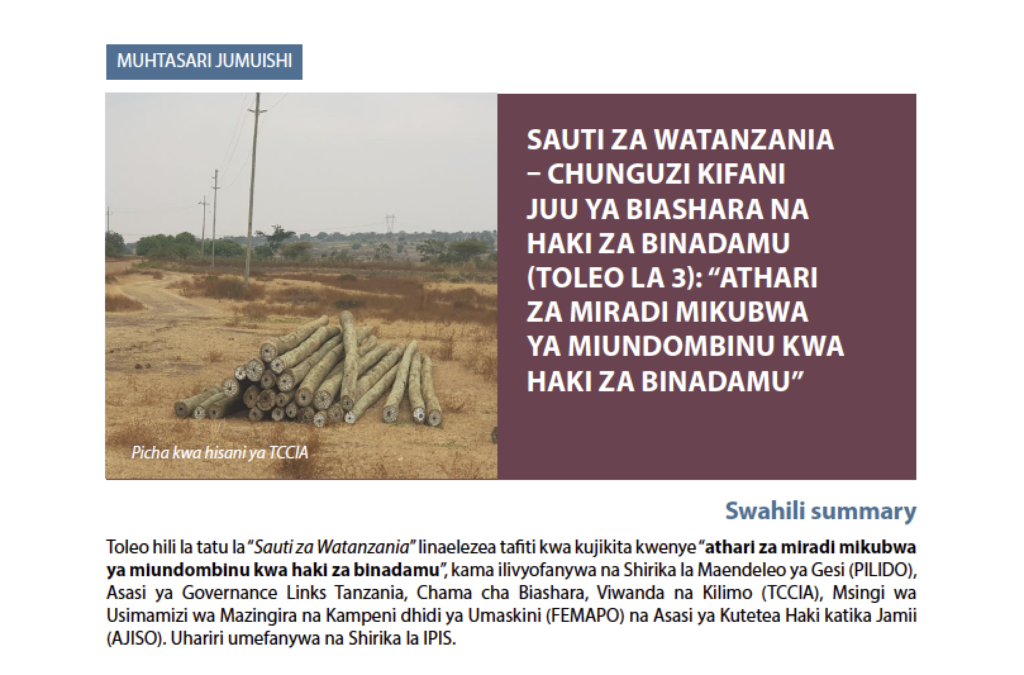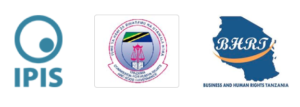In the framework of the EU-funded project “Improving monitoring, research and dialogue on Business & Human Rights in Tanzania” IPIS, the Tanzanian Commission for Human Rights and Good Governance (CHRAGG), and Business and Human Rights Tanzania (BHRT), launch the “Voices from Tanzania” series.
With this publication series, we want to provide editorial training and support for Tanzanian civil society actors who want to put their experiences and knowledge on business and human rights issues in writing. Many of them have unique knowledge and access to information on business and human rights challenges, but often struggle to reach a national, let alone international, audience
The “Voices from Tanzania” series strives to give a wider platform to Tanzanian civil society organisations. We aim to form a bridge between the hands-on local experience and expertise of Tanzanian civil society and an international audience of donors, researchers, private sector, NGOs, etc.
The “Voices from Tanzania” publications, including the analyses and recommendations presented, are based on the research conducted by our Tanzanian partners and solely belong to them. IPIS’ input remains limited to providing the necessary editorial training and support, and to supporting the dissemination of these publications as an edited volume to a wide, international audience.
VOLUME 1
“Voices from Tanzania – case studies on Business and Human Rights (Volume 1)” presents five case studies on pertinent corporate human rights issues in Tanzania as conducted by Business and Human Rights Tanzania (BHRT), the Commission for Human Rights and Good Governance (CHRAGG), Governance Links Tanzania, the Legal and Human Rights Centre (LHRC) and IPIS’ project manager in Tanzania.
The publication offers a diverse range of human rights topics, from human rights issues to watch during the planned construction of the East African Crude Oil Pipeline, to labour rights issues in the fish processing and cut flower industries of Mwanza and Arusha respectively, to the tense relation between tourism investment and land rights in Sadaani National Park, and that between forest conservation and limestone mining in Kigoma Region.
VOLUME 2
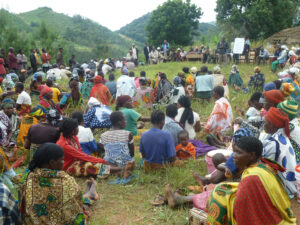 “Voices from Tanzania – case studies on Business and Human Rights (Volume 2)” presents four cases studies that focus on “land rights and environment”. The studies are conducted by Tanzanian civil society organisations Lawyers’ Environmental Action Team (LEAT) , HakiArdhi (the Land Rights Research and Resources Institute), Tanzania Women Empowerment in Action (TAWEA) and Community Economic Development and Social Transformation (Cedesota).
“Voices from Tanzania – case studies on Business and Human Rights (Volume 2)” presents four cases studies that focus on “land rights and environment”. The studies are conducted by Tanzanian civil society organisations Lawyers’ Environmental Action Team (LEAT) , HakiArdhi (the Land Rights Research and Resources Institute), Tanzania Women Empowerment in Action (TAWEA) and Community Economic Development and Social Transformation (Cedesota).
The case studies in the second volume address two pertinent issues: (1) how are initiatives to increase land tenure security and land use planning affecting rural communities, and (2) how are conservation efforts impacting land and human rights in villages adjacent to protected areas?The topics studied are the immediate impacts of the Land Tenure Support Programme (Kilombero – Morogoro), Village Land Use Planning as a tool for land (resource) governance (Kilolo – Iringa), and the impact of conservation actions in protected areas in Kigoma and Arusha on human rights of nearby communities.
VOLUME 3
In 2020, five new partner organisations prepared a third volume of case studies on the human rights impact of large-scale infrastructure projects.
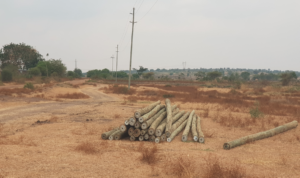 Central to these studies are questions of (1) human rights due diligence by implementing companies, (2) community impacts of specific infrastructure projects, (3) access to remedy in case of harm, and (4) community consultation, participation and awareness related to infrastructure development and human rights.
Central to these studies are questions of (1) human rights due diligence by implementing companies, (2) community impacts of specific infrastructure projects, (3) access to remedy in case of harm, and (4) community consultation, participation and awareness related to infrastructure development and human rights.
– Action for Justice in Society (AJISO – Moshi) “Large-scale Infrastructure Projects in Tanzania and their Impacts on Human Rights: Case of the Dar es Salaam-Moshi Railway Renovation Project in Mwanga and Moshi Urban Districts, Kilimanjaro Region“.
– Foundation for Environmental Management and Campaign against Poverty (FEMAPO – Arusha): “Human rights and citizen participation in the Tanzania Strategic Cities Project: case studies from Arusha and Dodoma“
– Governance Links Tanzania (Mwanza): “Business and Human Rights Footprint in the Construction of Regional Rusumo Falls Hydroelectric Project in Ngara District – NW Tanzania“
– Pilot Light Development Organisation (PILIDO – Arusha): “Impact of the East African Crude Oil Pipeline (EACOP) on Human Rights and Environment of Agro-Pastoral Communities in Kiteto District, Manyara, Tanzania”
– Tanzania Chamber of Commerce, Industry and Agriculture (TCCIA – Mwanza): “The impact of large-infrastructure projects on Business and Human Rights: case of energy supply in Mwanza rural communities, Tanzania”
To stay up to date on Business and Human Rights in Tanzania, subscribe HERE
Join the conversation on Twitter #bizhumanrightsTanzania
“Voices from Tanzania” is a collaboration between Tanzanian civil society organisations, the Tanzanian Commission for Human Rights and Good Governance (CHRAGG), Business and Human Rights Tanzania (BHRT) and the International Peace Information Service (IPIS). This publication is part of the ‘Improving monitoring, research and dialogue on Business & Human Rights in Tanzania’ project implemented by CHRAGG, BHRT and IPIS, with the financial support of the European Instrument for Democracy and Human Rights.

